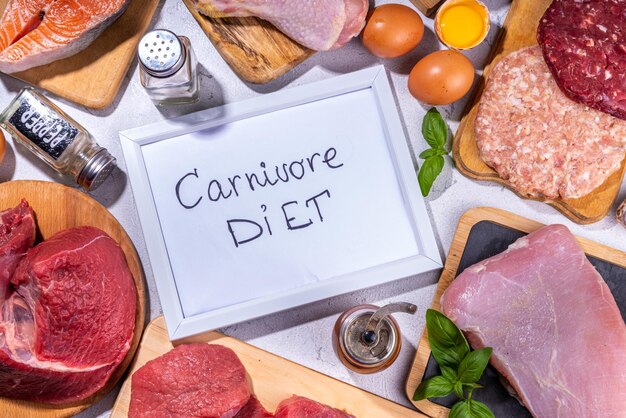The carnivore diet, which consists entirely of meat and animal products, excluding all plant-based foods, has gained popularity in recent years. Proponents claim it can help with weight loss, improve mood, regulate blood sugar, and even alleviate health issues like arthritis and diabetes. However, despite these claims, no controlled studies provide solid evidence that the carnivore diet can effectively address these concerns.
This article explores the carnivore diet, its potential benefits and downsides, and why a balanced diet with a variety of food groups is a healthier, more sustainable choice.
What is the Carnivore Diet?
The carnivore diet is an extremely restrictive eating plan that includes only animal-based foods, such as meat, fish, eggs, and certain dairy products. It eliminates all plant foods, including fruits, vegetables, legumes, grains, nuts, and seeds. Those who follow the carnivore diet typically avoid dairy foods high in lactose, like milk, but may consume small amounts of low-lactose options such as butter and hard cheeses.
The diet’s foundation is built on the belief that human ancestors ate predominantly animal products and that high-carb diets are responsible for the rise of chronic diseases in modern times. Unlike other low-carb diets such as keto or paleo, which still allow some carbs, the carnivore diet completely excludes them. The diet has been championed by figures like Shawn Baker, an orthopedic doctor, who claims that it can treat a range of health conditions. However, there is no scientific research to back these assertions.
How to Follow the Carnivore Diet
To follow the carnivore diet, one must completely eliminate all plant-based foods and consume only animal products. This includes beef, chicken, pork, lamb, turkey, fish, organ meats like liver and kidney, and eggs. Some people also consume small amounts of low-lactose dairy like butter, heavy cream, and hard cheeses.
Proponents recommend eating fatty cuts of meat to meet daily energy needs and incorporating organ meats to obtain certain vitamins that are absent in muscle meats, such as vitamin C. Additionally, drinking water and bone broth is encouraged, while beverages like tea, coffee, and soda are discouraged.
Can the Carnivore Diet Help You Lose Weight?
Some studies suggest that high-protein, low-carb diets may help with weight loss by increasing satiety, reducing calorie intake, and boosting metabolism. Protein-rich diets, like the carnivore diet, can make people feel fuller, which may lead to a reduction in overall calorie consumption. This could potentially result in weight loss in the short term.
However, weight loss benefits are not unique to the carnivore diet. Other, more well-studied diets, like the keto diet, which still allows for some carbs, also offer effective ways to lose weight. Moreover, the highly restrictive nature of the carnivore diet makes it difficult to sustain in the long run.
Potential Benefits of the Carnivore Diet
While the carnivore diet may result in short-term benefits, such as weight loss or improved blood sugar control, it is crucial to note that these benefits are not guaranteed. The elimination of processed carbs, sugars, and highly processed foods may lead to improvements in certain health markers, such as blood pressure and belly fat reduction. However, these benefits are unlikely to be sustained without the inclusion of other nutrient-dense foods.
Downsides of the Carnivore Diet
Despite its potential for weight loss, the carnivore diet has several significant downsides:
- Nutrient Deficiencies: By excluding plant-based foods, the carnivore diet eliminates important nutrients such as fiber, vitamins C and K, and antioxidants. These nutrients are essential for maintaining optimal health and preventing diseases. For example, the lack of fiber can lead to constipation and negatively impact gut health.
- High in Fat and Cholesterol: The carnivore diet is rich in saturated fats and cholesterol, which could raise LDL (“bad”) cholesterol levels. This may increase the risk of heart disease, especially for those sensitive to cholesterol. Processed meats, which are also high in sodium, can further increase the risk of high blood pressure and kidney disease.
- Increased Cancer Risk: Research has linked high consumption of red and processed meats to an increased risk of certain cancers, particularly colon and rectal cancer. The carnivore diet, which promotes excessive meat consumption, may raise these risks over time.
- Gut Health Concerns: The absence of fiber on the carnivore diet can disrupt gut health. Fiber plays a critical role in promoting healthy digestion and supporting beneficial gut bacteria. Additionally, the diet’s high protein content may lead to the production of harmful byproducts in the gut, potentially causing inflammation and other issues.
- Unsuitable for Certain Populations: People with chronic kidney disease or those who are pregnant, breastfeeding, or have eating disorders should avoid the carnivore diet. Its extreme nature can cause nutritional imbalances and may worsen existing health conditions.
A Better Approach: A Balanced Diet
While the carnivore diet may show some short-term benefits, it is unnecessarily restrictive and potentially harmful in the long run. A balanced diet, rich in fruits, vegetables, whole grains, lean proteins, and healthy fats, is a more sustainable approach to achieving and maintaining good health.
Incorporating a variety of foods ensures that your body receives all the essential nutrients it needs to function properly. For example, fiber, found in plant foods, supports healthy digestion, while antioxidants from fruits and vegetables help protect against chronic diseases. A diet that includes a diverse range of food groups is the best way to support overall health.
The carnivore diet may help with weight loss and other health issues in the short term, but it lacks critical nutrients and may pose long-term health risks. Its restrictive nature and exclusion of plant-based foods make it difficult to follow and sustain. A well-rounded diet that includes a variety of nutrient-dense foods is a safer and more effective approach to health and wellness. Always consult with a healthcare professional before making significant dietary changes.








